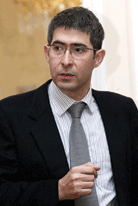|
News & Views item - August 2005 |
![]() "Une
Petite Revolution". New French National Research Agency (ANR) to Distribute
Research Funds on Competitive Basis. (August 28, 2005)
"Une
Petite Revolution". New French National Research Agency (ANR) to Distribute
Research Funds on Competitive Basis. (August 28, 2005)
In France research funds are traditionally given in block grants to institutions and labs to be distributed to individuals. Now, beginning in October, the newly organised National
 |
| Gilles Bloch - Credit: Le Figaro |
Research Agency (ANR) will follow mechanisms well known outside France to select research projects based on perceived scientific excellence.
Not surprisingly a number of older "entrenched" researchers have voiced disquiet about the changes. ANR's starting annual budget is to be €350 million (A$570 million) and is expected to grow rapidly. The worry is that funding will be drawn from the block grants (currently in the billions of Euros) allocated to the French science powerhouses such as the National Centre for Scientific Research (CNRS) and the National Institute for Health and Medical Research (INSERM).
Influential senior French scientists such as Edouard Brézin, president of the French Academy of Sciences argue that introducing competitive granting such as found in the US, Britain and Germany, for example, simply isn't right for France. "We have a different organization," Brézin told Science. "One shouldn't simply copy models from abroad without thinking."
And those researchers in favour of the introduction of a competitive system to play out along with block grants such as is practiced in Australia are disquieted by ANR operating with a minuscule staff and zero tradition. They worry tha the ANR "won't measure up to the quality standards of the foreign examples it seeks to emulate".
But ANR's director, 44-year-old biophysicist and physician Gilles Bloch dismisses the objections. What counts he told Science is that the research community has responded overwhelmingly. With almost all of ANR's first 35 calls for proposals now closed, some 5300 applications have been received. More than 600 researchers volunteered to be reviewers and it is estimated that a quarter of the proposals will receive awards.
What will be of interest to Australian scientists who apply to the Australian Research Council is the observation reported by Science:
Bloch insists: ANR takes the place of two funds, now dissolved, which doled out money on a project-by-project basis: the National Fund for Science and the Fund for Technological Research. They reported directly to the ministry of research, however, and both were widely suspected of being subservient to politics. Besides having a much more generous budget, ANR will be autonomous in selecting grantees.
The Federal Government determined that the ARC's Board be dissolved at the beginning of 2006.
Finally, according to Science, while Brézin says he and many others in the research community "were never opposed to the principle" of awards based on merit he feels the government seems intent on using the agency as a way to attack established research agencies such as CNRS and INSERM. However, others point out that these flagships of French science can be overly bureaucratic and unwelcoming to new ideas, and that it takes too long before young researchers are allowed to form their own research groups. Former research minister Claude Allègre made the scathing comparison that they were similar to "Soviet-style" institutes.
One thing is certain, French science funding is in for a shake up.